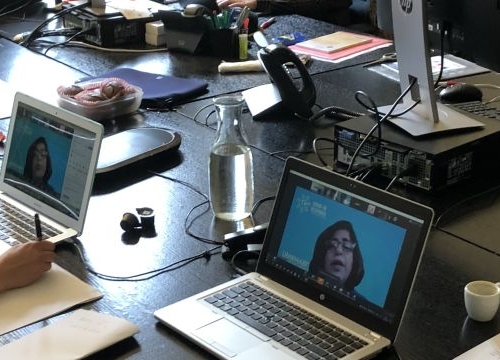Experts Discuss Human Rights at the City Level


Geneva Academy
11 May 2020
In an online conference co-organized by the Geneva Human Rights Platform, UN-Habitat, the Office of the UN High Commissioner for Human Rights and the Geneva Cities Hub, around 60 experts – local activists, academics as well as representatives from local authorities, civil society, international organizations and the private sector – exchanged around best practices to ground the development of cities in a human rights framework.
The Role of Local Government in Promoting and Protecting Human Rights
‘Participants in the meeting stressed the importance of local governments to promote and protect human rights at the local level. While cities and local government are currently not represented in international fora like the UN, their voice could be brought via other actors like UN-Habitat or the Geneva Cities Hub‘ explains Kamelia Kemileva, Director a.i. of the Geneva Cities Hub.
The meeting also discussed categories of vulnerability at the city level such as elderly people and people with disabilities but also people living with HIV/AIDS, migrants and LGBTQI people.
‘For some of these groups, their very own ‘illegality’ or ‘criminality’ is a primary barrier to inclusion in cities, housing rights frameworks, and to their access to basic services and rights. The COVID-19 crisis only exacerbates these inequalities, pushing members of these groups to find informal solutions, which at the end of the day are counterproductive to their intentions and needs’ explains Kamelia Kemileva.
Participants also reiterated that human rights are not aspirations, or social objectives but legal standards that can and must be built into the legal architecture of different systems – housing, public health, transport, etc. They stressed that rights can only be fully respected and enforced if they are embedded into legal norms, notably at the local level.
Towards Inclusive Cities for All
This meeting is the first of a longer series that aims at developing operational documents for local governments, city-level practitioners and decision-makers, as well as national governments interested in the local governance issues.
These documents will provide guidance on how to translate human rights standards at the city level, notably in relation to gender; inclusion of children and youth; inclusion of older persons and persons with disabilities; as well as the inclusion of groups at risk of marginalization like refugees or indigenous peoples, but also within city contexts groups that are less-mentioned but also vulnerable like sex-workers and drugs-users.
‘This expert group meeting is the first of a series on inclusive cities. Of course, we have a selfish motive: we want to pick the brains of the best human rights thinkers, practitioners and get them to tell us how we can mainstream a human rights-based approach across our work through these domains of change and the outcome areas of our Strategic Plan. The engagement doesn't end here, it just begins here. We also want to bring this group together as a wider community of practice to work with us as we go about developing some of the ideas further into guiding principles, key indicators, tools, methodology, etc., implementing them over the next three years’ stresses Shipra Narang Suri, Chief, Urban Practices Branch, UN-HABITAT.
‘It is key to ensure that the international human rights framework and decisions taken by Geneva-based human rights bodies are implemented at the local level. We are therefore thrilled to be involved in this project as it represents a new dimension for us that includes local governments. This can help bridging discussions between Geneva and the field’ explains Felix Kirchmeier, Executive Director of the Geneva Human Rights Platform.
‘The Geneva Cities Hub fosters this dialogue and facilitates relations between organizations in Geneva and local governments’ underlines Kamelia Kemileva.











